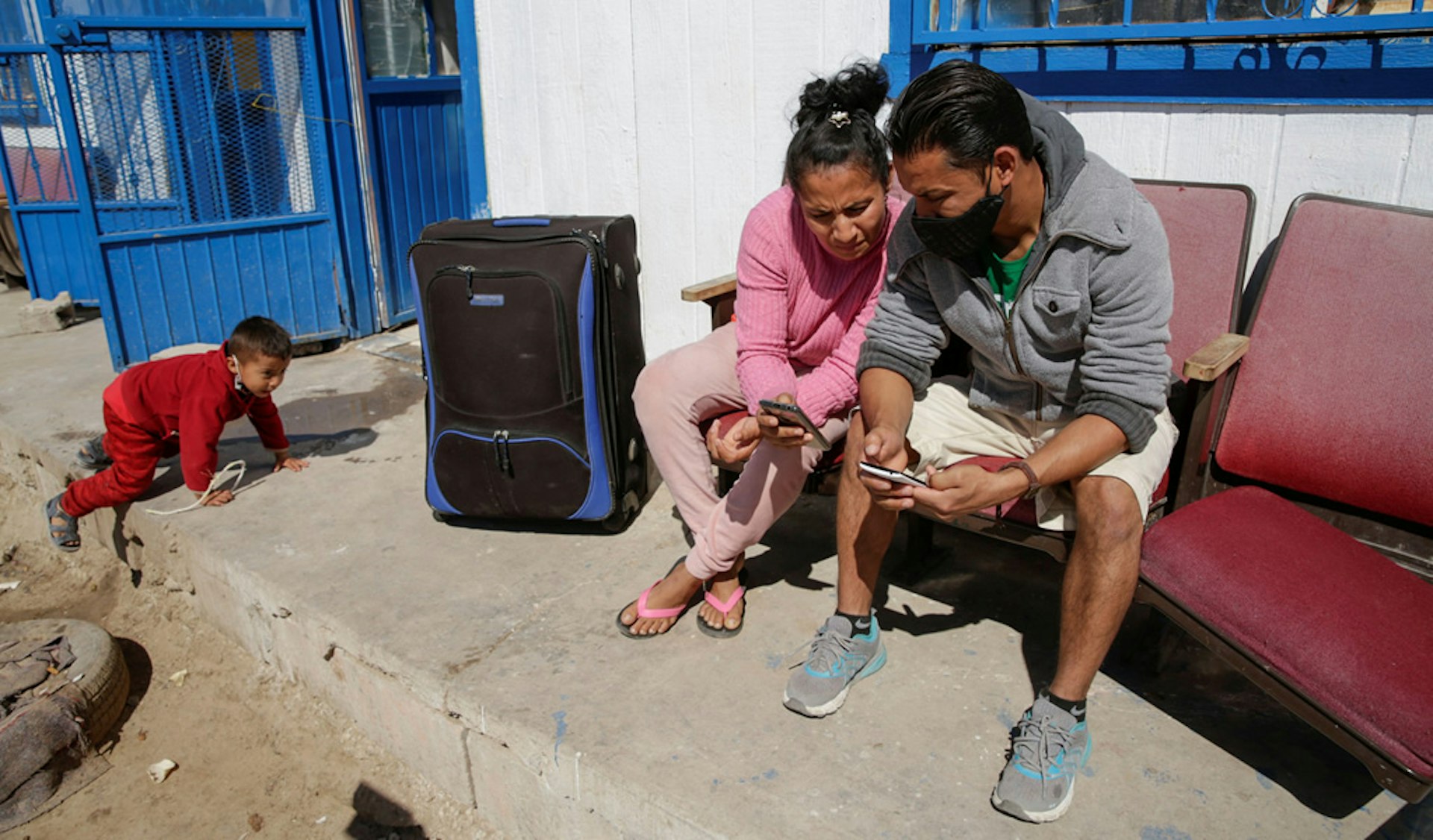Migrants undertaking the perilous journey to the U.S. are overwhelmingly dependent on Facebook and WhatsApp, yet the platforms’ owner, Meta, has done little to stop dangerous misinformation targeting them, according to a new survey of migrants headed to the U.S.
The study, conducted by the Tech Transparency Project (TTP), revealed that migrants were well aware of the myriad ways in which incorrect or deceptive information on social media platforms could make their lives more dangerous. Migrants told TTP that Facebook and WhatsApp connected them with individuals who promised to help them gain entry to the U.S., only to steal their money or abandon them in dangerous situations.
TTP also found an abundance of posts spreading misinformation about immigration law, conditions along the route to the United States, and the opportunities available to migrants to the U.S. Many migrants expressed frustration with the abundance of misinformation on the platforms. “It’s difficult because you can’t tell what source of information is reliable,” one migrant said.
Even so, many migrants fleeing violence or desperate for a better life felt that they had no choice but to wade through the sea of deceptions on social media. “I believe in what people say and whoever leads us [across the border],” one respondent who found a coyote on Facebook said. “I have nothing else to believe in.”
As the number of migrants arriving at the U.S. border with Mexico soars to the highest level in decades, the role of rumors and misinformation in driving migrants northward has gained increasing attention. But we still know surprisingly little about the information environment that these U.S.-bound migrants are immersed in—the sources they trust, how they parse fact from fiction, and the impact of social media on their real-world experiences.
To explore this issue, TTP assembled a team of interviewers to talk with U.S.-bound migrants from Central America about their information consumption, including the social media accounts, pages, and groups they follow. The team spoke with 200 migrants, half of them south of the Mexican border in Guatemala, at the beginning of their journey northward, and half in shelters just south of the U.S.-Mexico border.
We found that migrants depend heavily on Facebook and WhatsApp for guidance about how to get to the U.S. Many said they used the apps to communicate with other migrants or with social service organizations in receiving communities. Others had used the platforms to connect with “coyotes,” or smugglers who help undocumented migrants travel to the U.S. But many migrants also embraced false claims made online, like the belief that the borders are open now that the Covid pandemic had eased, or that pregnant women are allowed to enter the U.S. without documentation. Others expressed a general sense that migration is “easier” now—a sentiment not supported by official statistics or other measures.
TTP analysts were often able to identify the origins of these rumors in the Facebook pages, WhatsApp groups, and other social media that migrants told interviewers they relied on for information. On Facebook and WhatsApp, TTP found dozens of false and misleading posts about changes to immigration policy, special rules for parents and pregnant women, or favorable conditions along the migration route.
Migrants are often victims of fraud, violent crimes, unsafe conditions, and sexual exploitation while traveling and in their destination countries, and there’s growing awareness that misinformation can increase their exposure to these threats. In 2020, for example, Human Rights First documented the case of a Honduran asylum seeker who was sexually assaulted in Mexico after responding to an ad for a housekeeper on Facebook.
The recent discovery of a truck carrying the bodies of 46 dead migrants in San Antonio underscores how important it is that migrants have access to reliable information in order to make safe, informed decisions about their journey.
Our interviews with migrants and review of social media data show that the platforms—especially Facebook—are failing to protect some of the most vulnerable people in the world from misinformation that could defraud them, lead to deportation, or put their lives at risk.
Specifically, the study found that:
- Most participants in the survey relied on online sources for information about their journey or conditions in the U.S. Nearly all traveled with a smartphone or tablet.
- Almost 70% of migrants say they regularly get information from Facebook, more than any source other than word-of-mouth.
- Nearly a quarter of respondents said they used WhatsApp, the messaging app owned by Facebook parent company Meta.
- Respondents told our interviewers that Facebook and WhatsApp had connected them with fraudsters who stole their money, abandoned them in unsafe conditions, or gave them bad information.
- Many migrants told TTP interviewers they had heard misinformation about the ease of travel to the U.S. or special rules that would allow them to enter without documentation.
- A review of social media groups and pages identified by migrants showed an abundance of misinformation. TTP’s analysis found dubious offers of coyote or legal services, false claims about conditions along the route, misinformation about points of entry at which officials waive the rules, and baseless rumors about changes to immigration law.
- Despite this, Facebook remained popular among migrants. When asked which source of information they trusted the most, word of mouth came first. But Facebook was a close second, with nearly a third of respondents saying they trusted the platform.
- Human rights NGOs along the U.S.-Mexico border appear to use the tech platforms to reach migrants to mitigate the effects of misinformation.
- Still, many migrants never receive that help, and must navigate online fraud and misinformation on their own. More than a dozen respondents had stories of being defrauded by coyotes or other individuals seeking to exploit migrants.
- Many respondents expressed frustration about the prevalence of misinformation targeting migrants. “I don’t trust anything” was a common refrain.
For this survey, TTP interviewers asked migrants about how they accessed information, the sources they used and trusted the most, and how rumors or misinformation had affected their lives. The interviewers also asked migrants to name specific social media accounts, pages, or groups that they followed. Analysts joined and followed these online sources and reviewed their contents to get a deeper understanding of the information environment surrounding U.S.-bound migrants. The surveys were conducted in Spanish or in Mayan dialects, and the responses quoted in this report have been translated for an English-speaking audience.
This was not a scientific survey and the participants were not necessarily a representative sample of everyone who travels to the U.S. The survey was not intended to gauge whether social media causes more or less migration. But participants' stories carry useful lessons about the promises and pitfalls of tech platforms for some of the world’s most vulnerable people.
This report is the first of a series by TTP that will explore how information online affects the lived experience of migrants in the real world. In the coming weeks, TTP will take you inside social media through the eyes of a migrant traveling toward the U.S. We’ll also look at how misinformation in receiving communities affects attitudes toward migrants in Mexico and the United States.
Connected and Tech-Savvy
Nearly all of the migrants who spoke to TTP interviewers carried a smartphone or tablet, and regularly used it to access the internet. Smartphones serve as a lifeline for migrants who make long journeys across unfamiliar and often dangerous terrain.
“We all carry a phone so that we are connected in case something bad happens on the road or someone gets lost,” one migrant said.
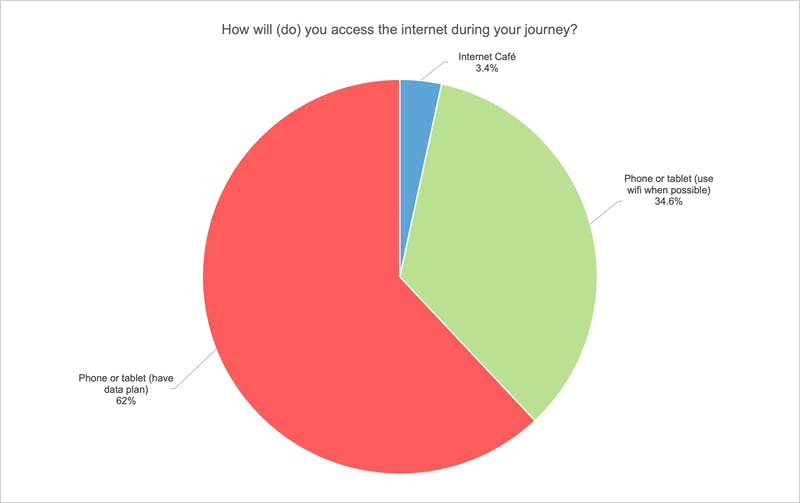
More than three quarters of respondents told interviewers that they regularly received information from a platform owned by Meta: Facebook, WhatsApp, or Instagram. A handful of migrants also told us that they relied on YouTube, Twitter, or TikTok.
These results transcend age. Survey respondents varied in age from 12 to 58, and we found that older participants were just as likely to carry smartphones and get information from social media as younger ones.
Online social networks appear to connect with real-world social ties. Many respondents told us that they learned about online spaces for migrants through word of mouth and that they have recommended specific social media accounts to other people.
Migrants depend on tech platforms to communicate with their traveling companions, connect with legal and social services, and locate coyotes who can help them cross the border:
I found the person who will help me cross the border and enter the United States through a Facebook page.
There was a WhatsApp group. … They informed us about the conditions for crossing the border in each country.
I discovered this WhatsApp group while in Tapachula. One of the administrators registered me and on that platform they share all kinds of information about both the caravan and the people who provide their services to cross the border.
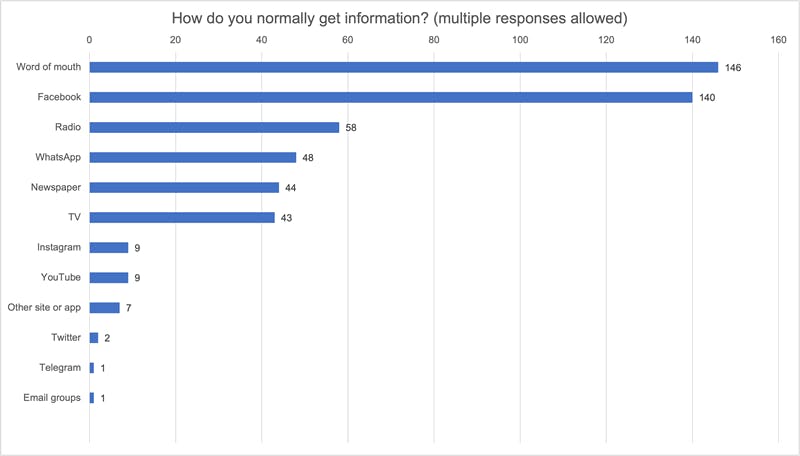
Several migrants told interviewers that they had connected with coyotes online. Offers of passage to the U.S. abound on Facebook. Coyotes advertise directly to migrant-focused Facebook or WhatsApp groups, or in local buy-sell groups, where ads for migration help mingle with postings about motorcycles and used furniture.
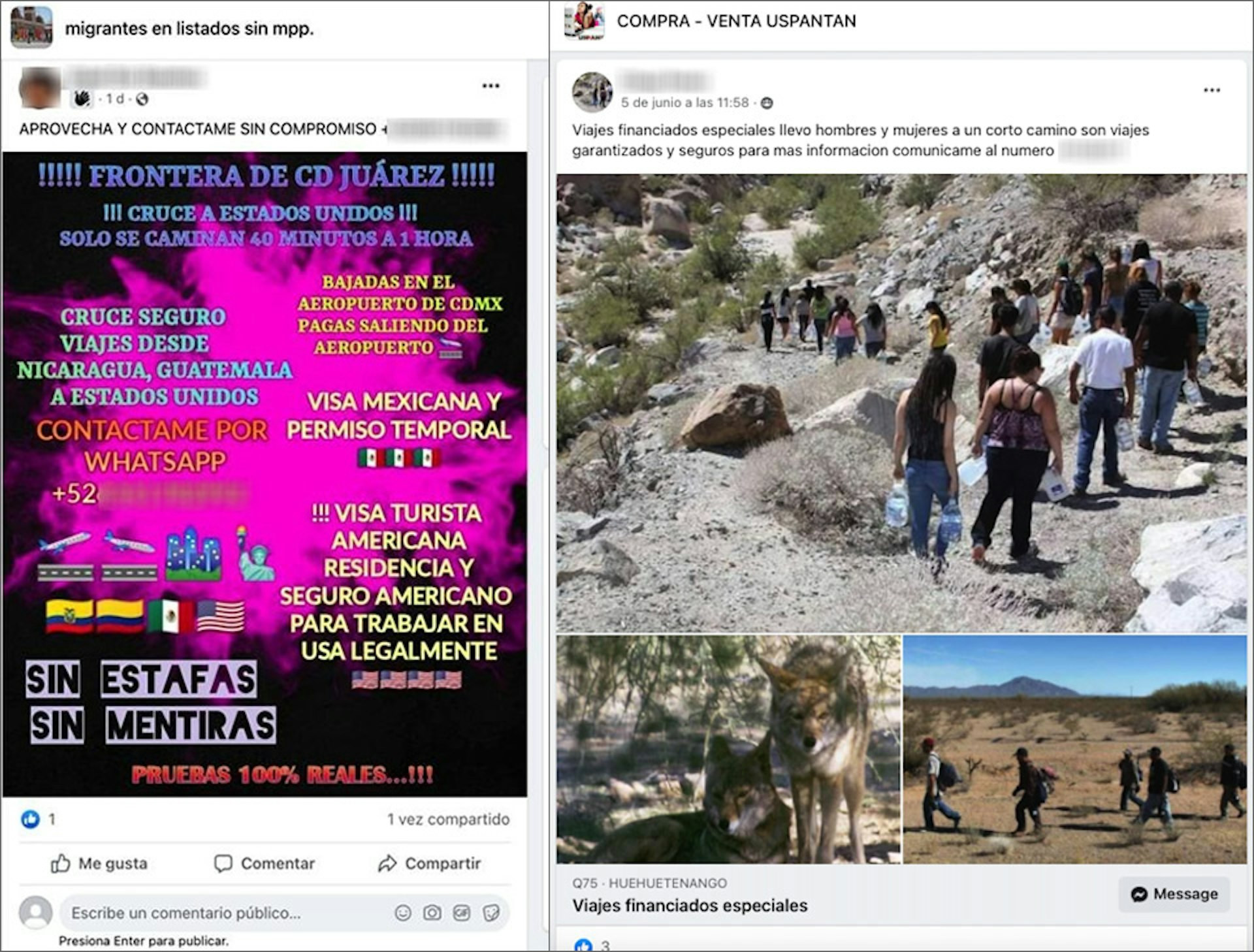
The same content often appears across multiple groups and platforms, like this ad offering a faster trip to the U.S. posted to caravan groups on both Facebook and WhatsApp:
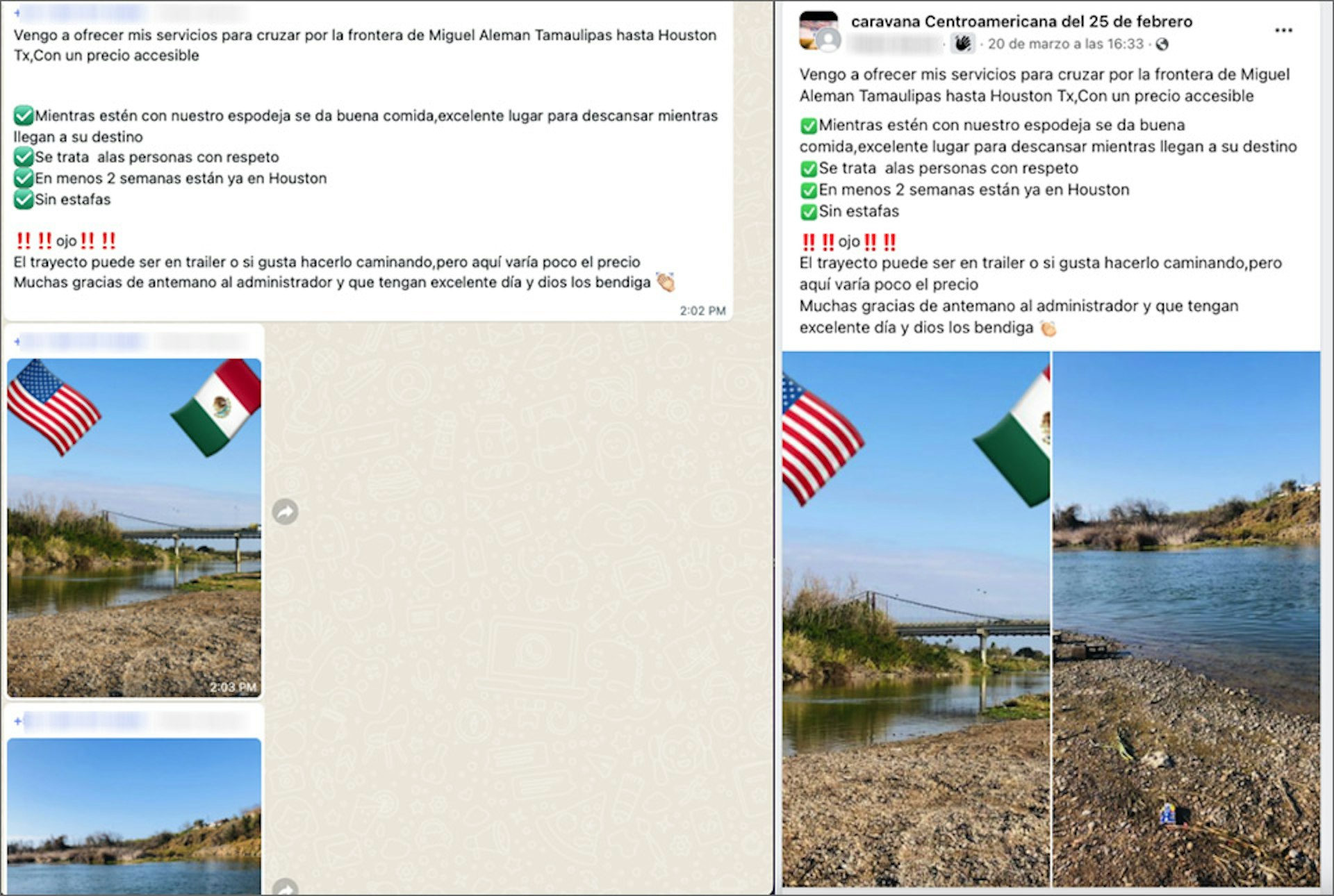
In migrant groups, coyotes often respond to questions about conditions at the border or the status of U.S. immigration law with offers of fake documents or transportation.

Not all of these advertisements are scams. The services they offer may be illegal, but some of the coyotes or forgers on Facebook likely do provide what they promise. But, as many survey respondents told TTP, people selling coyote services are often fraudsters.
Take the Facebook account for “Alejandra Utis,” which advertises coyote services using a profile picture stolen from a travel blogger named Mariel Galán. The ads use stock photos for leisure travel to avoid detection, but make references to the American dream and the amount of time that travelers will be required to walk—revealing that “Alejandra” isn’t advertising vacations.
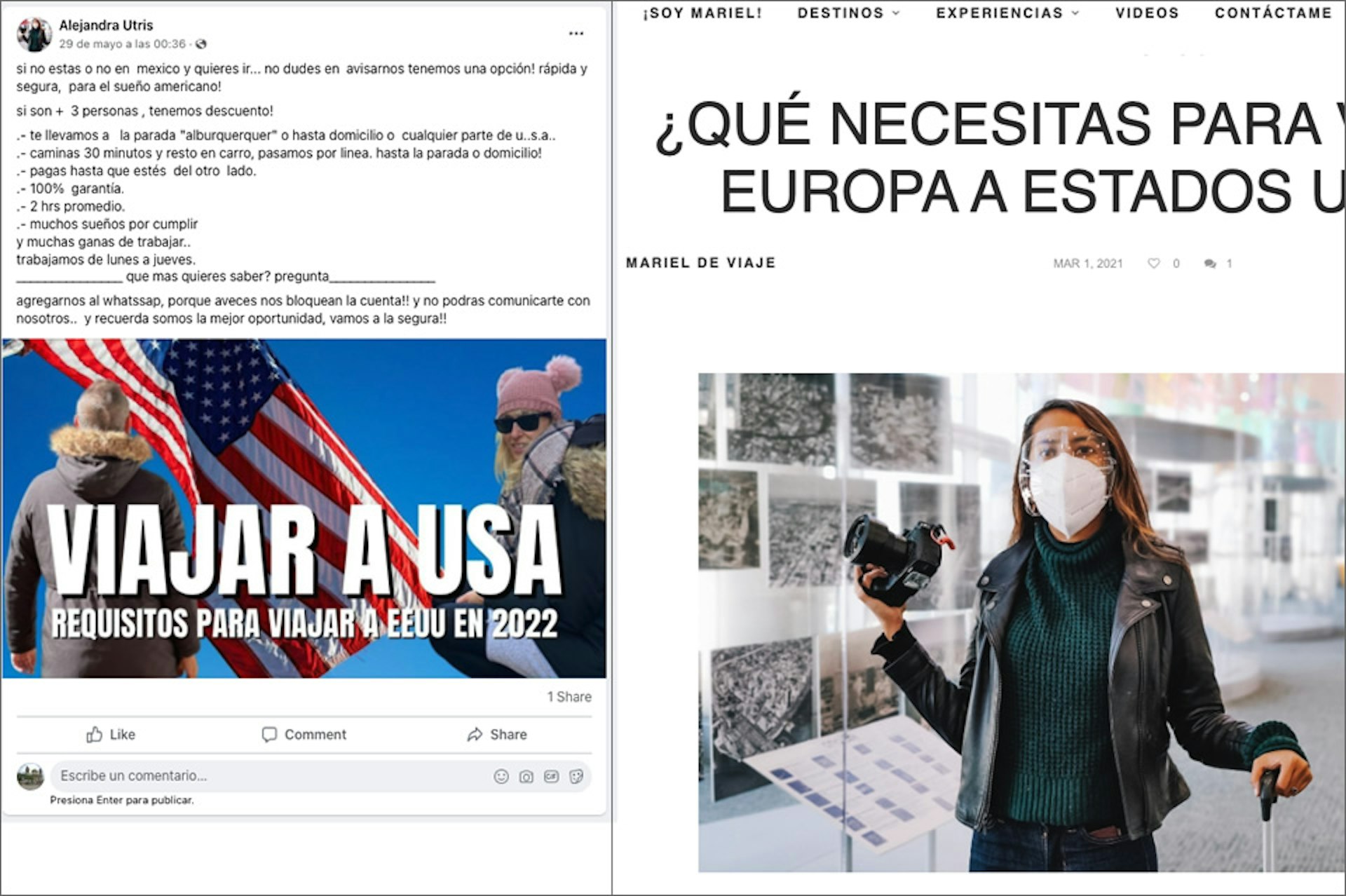
In another likely scam, a post promoting a widely advertised and since-deleted document-forging account used the logos of Mexican government agencies, in a move seemingly intended to trick migrants seeking government assistance into paying the forger instead.
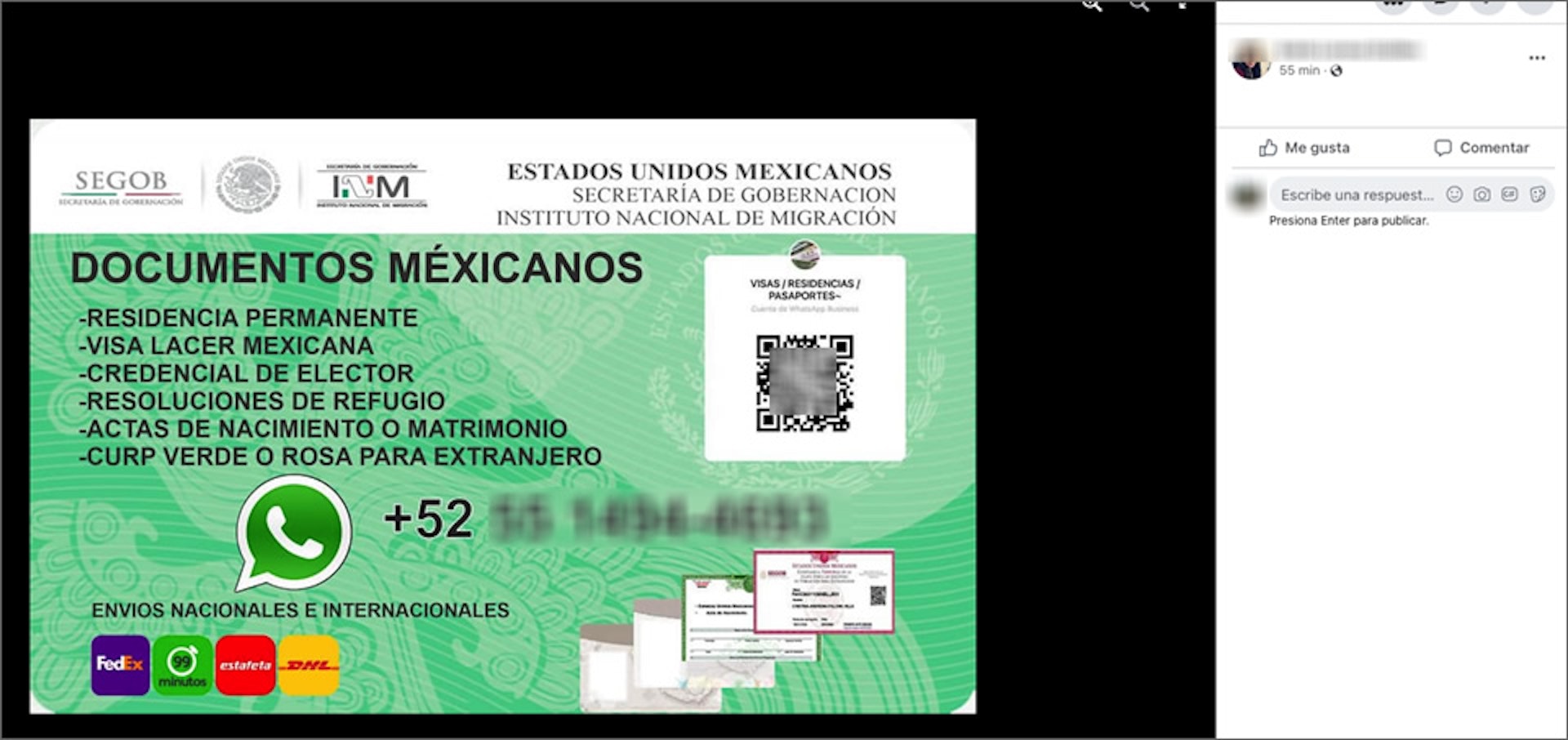
Meta Dominates
More than half of respondents said that they used Facebook or WhatsApp to get information about conditions on their route or in the U.S. After word-of-mouth communication, Facebook was the second most frequent answer to the question, “Which source of information do you trust the most?”
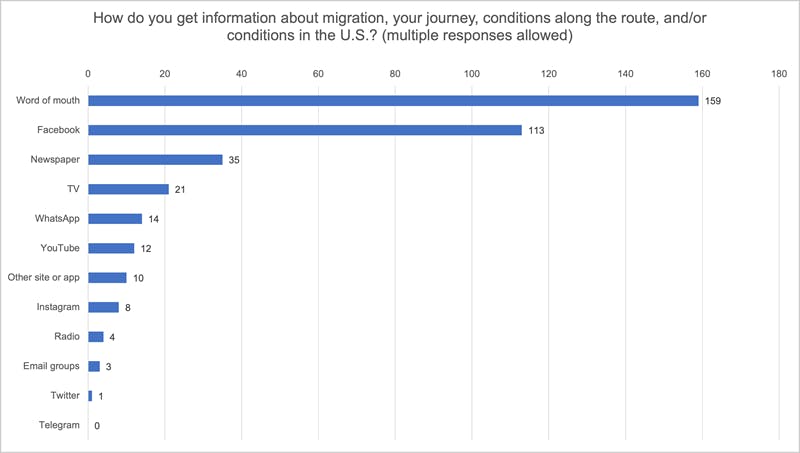
Migrants told interviewers that information posted on Facebook was “the most real” and that it reflected the experiences of people who had migrated to the U.S. WhatsApp was also popular with migrants because they perceive it as direct communication with people who have personal knowledge about migrating to the U.S.
But the popularity of these platforms also makes them targets for scammers seeking to defraud migrants by infiltrating group accounts. Our interviewers heard numerous stories of migrants who had been deceived by someone they met on Facebook or WhatsApp:
People publish information in Facebook groups that isn’t real—they only want to scam people. In August I consulted with someone through a Facebook account, and all of the information that they sent tried to deceive me, nothing more.
In one of the WhatsApp groups they lied about the ways to travel to the U.S. The things they said weren’t true—they just wanted to swindle us or use us as a means of transporting drugs. This happened to a family a month ago. They followed that information and they disappeared. There are rumors that they were kidnapped by drug traffickers but we don't know where they are.
In the WhatsApp group they don’t only share information about the caravan. There are also scammers who indicate that they can help us cross the border but only aim to steal our money.
Previously I traveled alone and I relied on a Facebook account for support, but they cheated me.
On Facebook, they promote trips [but] when I looked into it, all of the information they gave me was false.
Other respondents named specific Facebook accounts that they said had promised safe passage to the U.S., only to take their money and turn them in to immigration authorities.
Facebook and WhatsApp are also rife with misinformation about the ease of travel to or entry into the U.S. In the pages and groups that survey respondents said they followed, TTP found false and misleading posts about points of entry into the U.S. where the authorities decline to deport undocumented migrants, special rules exempting pregnant women or migrants with children, or favorable environmental conditions along popular routes.
It is unclear whether these posts reflect intentional disinformation or simply unwitting misunderstandings, but the effect of these messages—a widespread belief that entry to the U.S. is easier than it is—is the same.
In a recent post in a Facebook group for migrants attempting to cross the Rio Grande at Eagle Pass in central Texas, an administrator posted a photo taken from an angle that makes it appear as if the riverbed is completely dry. The same image appeared in a WhatsApp group. In fact, historical data from the U.S. Geological Survey shows water levels nearing three feet deep on the day of the post and during the week prior.
One respondent said that the photo was “purely a lie.” The previous week, authorities recovered the bodies of three drowned migrants near the same location.

Some of the false information posted online about environmental conditions appeared to influence survey respondents’ decision-making about their own migration attempts. One respondent said that they had been told that it would be easy to cross the desert this spring. Nine other respondents told TTP interviewers that they had decided to migrate now because they heard that it was currently “easier” to travel to or enter the U.S.
Misunderstandings about changes to U.S. immigration law can also contribute to misinformation. On WhatsApp, a cropped image of a news story about Texas Gov. Greg Abbott’s immigration policies created the false impression that Texas was no longer deporting migrants.
On Facebook, a poster was told that they would be allowed to enter the U.S. with their children during May and June because Title 42, a policy of immediately expelling migrants on public health grounds first invoked by the Trump administration at the start of the coronavirus pandemic, was set to be repealed.
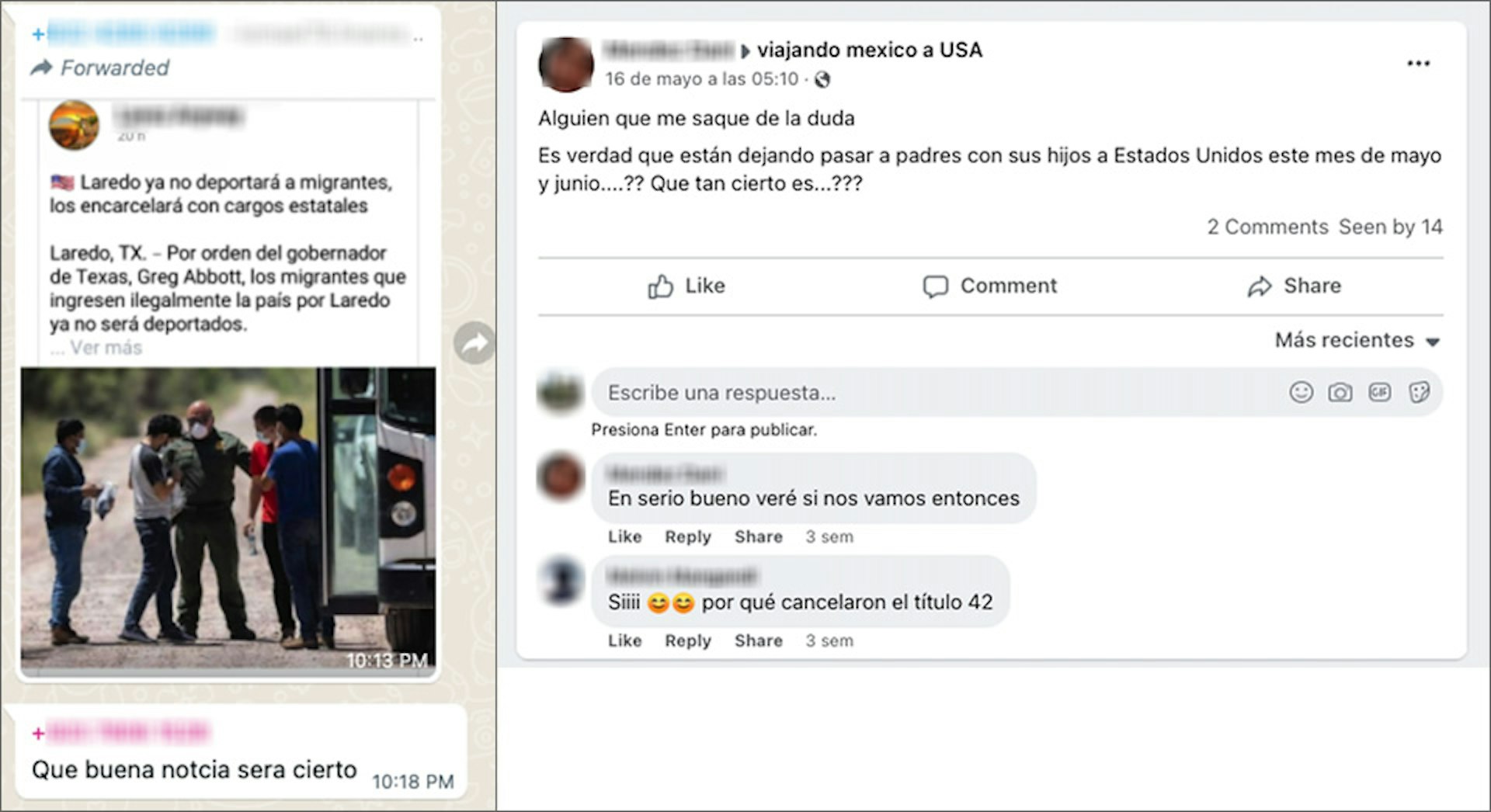
The legal machinations surrounding Title 42 are a particularly potent source of confusion and misinformation. The policy, which led to the immediate deportation of most asylum applicants, was originally scheduled to sunset on May 23, leading many migrants to falsely believe that the borders would be opened on that date.
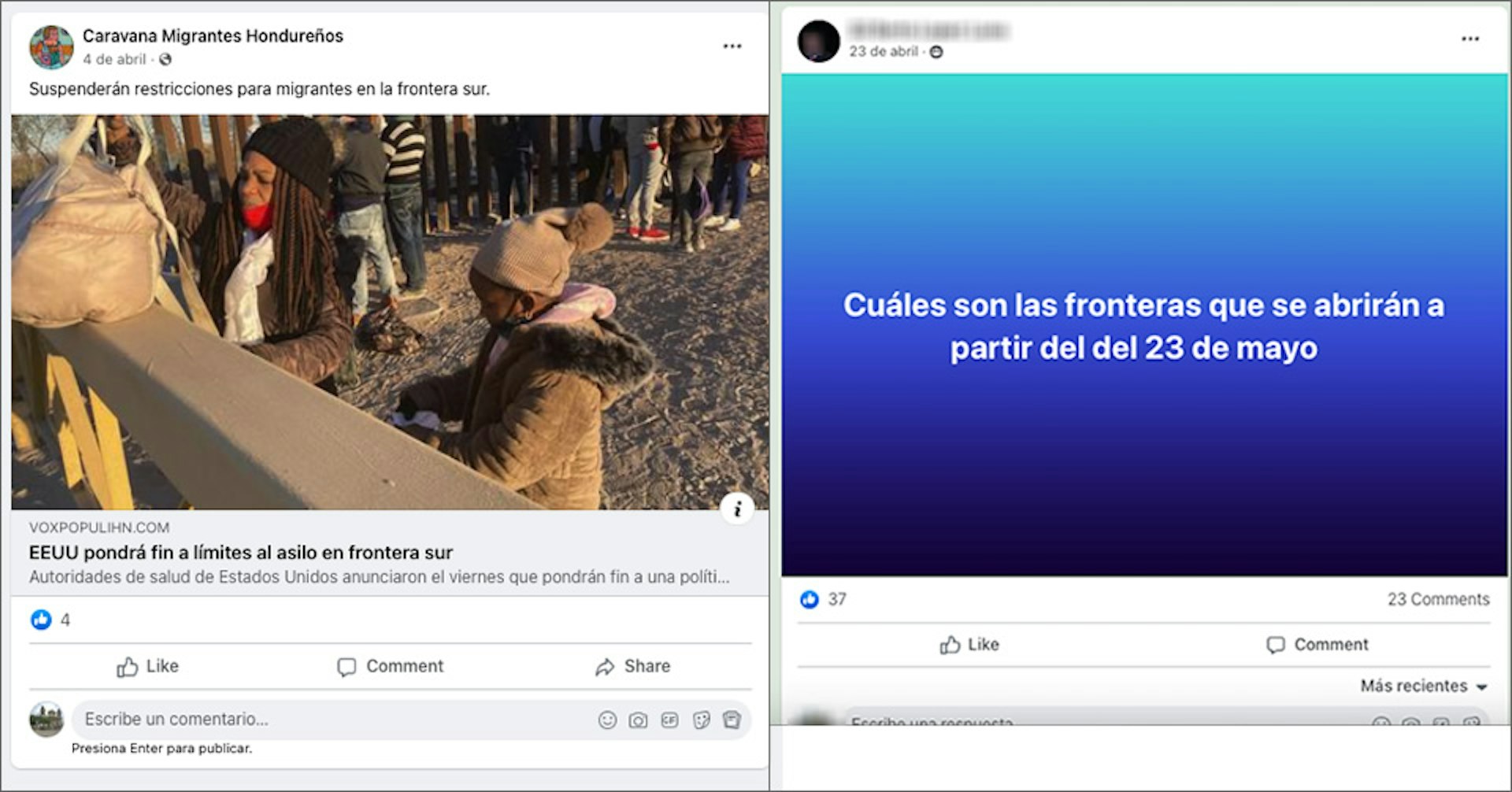
One migrant told a TTP interviewer that it was the best time to migrate “because the borders were opened after Covid.” In reality, terminating Title 42 would only change how asylum petitions are processed by allowing for processing and detention in the U.S. (Title 42 remains in place after a federal judge blocked the Biden administration from lifting the regulation.)
Misinformation circulating on these platforms often suggested that immigration rules did not apply at certain border crossings. In one exchange in a WhatsApp group, a migrant asked about border crossings where immigration authorities are not enforcing regulations, and was told to go to Ciudad Acuña, a city near an international bridge to Del Rio, Texas.
U.S. officials have deported or detained thousands of migrants who crossed into Texas from Acuña within the past year.
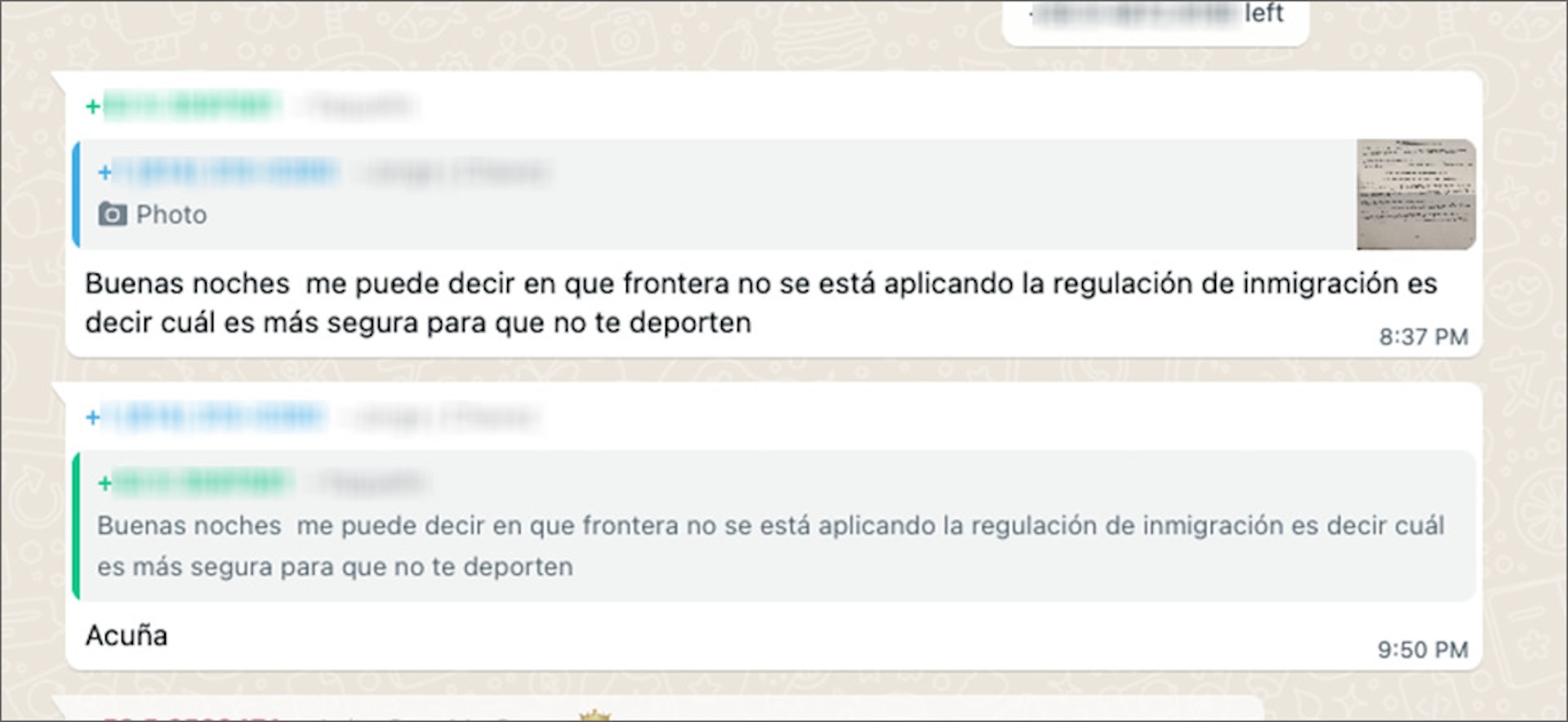
Another common rumor held that more lenient rules applied to pregnant women or families with young children. One migrant told a TTP interviewer that they had heard that “they would let you pass” if you were traveling with children. Another said she had chosen to migrate at that time because she was pregnant and wanted to take advantage of “suddenly being allowed to enter the United States.”
Another migrant said that her coyote told her that mothers with children would be allowed to pass, and that trusting this information led to her deportation.
On Facebook, migrants asked for clarification or reassurance about these rumors. Respondents told these posters that pregnant women would be allowed to enter depending on how advanced the pregnancy was. In reality, no such contingency applies. In fact, immigration officials have allegedly worked to prevent pregnant asylum seekers from being present in the U.S. when they gave birth.

To be sure, migrants and their advocates also use tech platforms to dispel misinformation and raise awareness of helpful resources. HIAS Mexico, a branch of the international aid NGO Hebrew Immigrant Aid Society, frequently runs Facebook posts urging migrants to avoid common scams and rumors, including misinformation surrounding pregnancy exceptions.

Several migrants in shelters along the U.S.-Mexico border told our interviewers they had used Facebook to connect with reputable NGOs or government agencies that assist migrants attempting to navigate complex immigration laws:
The Facebook page [for the transnational NGO] Al Otro Lado provides information about topics related to political asylum and Title 42.
I found the [Facebook] page for HIAS Mexico, which provides legal services to people under the MPP program, through others in the shelter and decided to follow it.
I follow the Facebook page of the Human Rights Directorate of the Ciudad Juarez Migrant Assistance Office because they are handling my political asylum case.
Migrants who cited these Facebook accounts told interviewers that shelter employees or NGO workers referred them to the pages. They were fortunate: Migrants who had not yet connected with social welfare organizations were often forced to rely on anonymous internet posts, unscrupulous coyotes, or unfounded rumors, sometimes with devastating consequences.
The dire consequences of misinformation
For migrants making the precarious journey to the United States, acting on misinformation had devastating consequences. Participants in this study told interviewers harrowing stories of being deported, abandoned in dangerous terrain, or robbed of their life savings. One migrant at a shelter near the U.S.-Mexico border told an interviewer, "In the shelter you can see many cases of people who in one way or another were deceived and abandoned along the journey."
Because of the false information I received from the coyote, I was deported. They deceived me by telling me that they were letting mothers with children pass [through the border], but it wasn’t true.
There are coyotes who don’t hold up their end of the bargain. They scam people. [Migrants] suffer along the way, because they have to walk in dangerous areas for many days and some get lost.
My husband managed to raise enough money to pay a coyote to cross the border, but unfortunately I was deceived and they just left me to my fate.
Many migrants expressed frustration that it was impossible to discern fact from misinformation online. One respondent told an interviewer that “everyone lies or manipulates information.” But many also told us they feel that they have no choice but to trust what they read and hear.
“We are not safe anywhere … but we go with faith that we will arrive safely,” one migrant said.
“I believe in what people say and whoever leads us. I have nothing else to believe in.”
